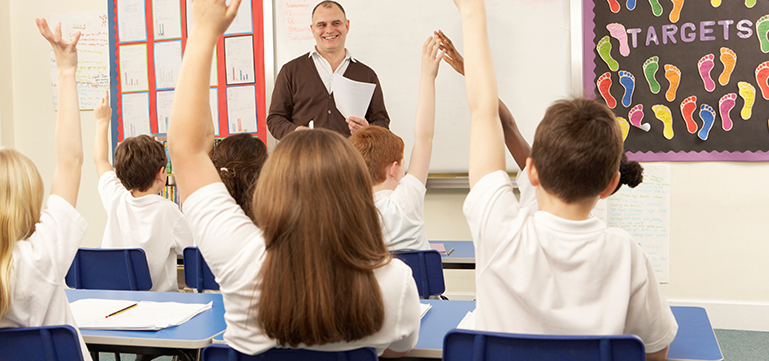Raising standards of wellbeing among pupils and staff

Quick links:
Information about the school
Soon after taking on their role, the headteacher realised that a number of pupils were experiencing emotional difficulties, and found it hard to calm down after break times. They had trouble focusing on their work, expressing their feelings and engaging with learning. After conducting an internal assessment, and contacting experts and parents, staff began planning a strategy and organised specific interventions to improve pupils’ wellbeing and emotional security.
The school has an effective procedure for tracking and monitoring pupils’ wellbeing on a daily basis, enabling staff to respond immediately to any concerns that may arise. Intervention sessions take place to promote positive attitudes among pupils, enabling them to share their concerns, discuss their feelings and model appropriate behaviour that allows them to address their feelings. In order to raise staff awareness, leaders were given useful opportunities to observe effective strategies at a school within the regional consortium. Following this visit, specific training was organised for pupils, staff, governors and parents. The project was funded by a grant.
Description of nature of strategy or activity
There are regular assessments to monitor pupils’ wellbeing across the school. In addition, specific questionnaires are distributed, asking pupils about their feelings and concerns. Assemblies are held to discuss morals and spiritual elements, there are sessions to promote healthy and positive relationships, therapy sessions, classes for parents and a wrap-around care programme. Staff seek to ensure that the school environment is calm, homely, supportive and caring. Pupils are given the opportunity to contribute to this ethos by posting messages into an ideas box and creating specific rights and values that are central to all the school’s actions and which reinforce pupils’ personal, social and emotional wellbeing successfully. The ‘Playground Buddies’ system encourages pupils to be kind and to include all their peers in activities during break times.
Among the most effective activities in ensuring that pupils exercise self-control are the regular relaxation and calming sessions conducted at various times during the day, especially at the end of break times. These sessions promote effective standards of mindfulness among pupils and staff. They help to improve pupils’ concentration skills, foster resilience, and encourage them to engage with learning, by adding value to existing appropriate education programmes. Teachers encourage pupils to practice these transferable skills at home as well as at school.
What impact has this work had on provision and learners’ standards?
This work has contributed to raising standards of wellbeing among pupils and staff, and improved pupils’ behaviour across the school. Pupils now calm down immediately after wellbeing sessions, focus better during lessons, are aware of how to relax and can discuss their feelings and share concerns with each other and with staff. All of these strategies have contributed significantly to raising standards and inspiring pupils to be healthy, confident and ambitious individuals.
Parents praise the positive impact of the wellbeing discussion sessions on their children, attesting that they concentrate for extended periods, engage better with their learning and go home at the end of the school day in a calmer and more positive state of mind. In the foundation phase, progress among many boys and girls has been as expected or better than expected in almost all areas of learning and almost all pupils that are eligible for free school meals have made progress in literacy and mathematical development this year. In key stage 2, most have made expected or better than expected progress in Mathematics, Welsh and Science, while most boys and almost all girls have made expected progress in English. Nearly all pupils that are eligible for free school meals have made expected or better than expected progress in English, Welsh, Mathematics and Science this year.
How have you shared your good practice?
The school shares its good practice constantly with parents, governors and the local community through its website and the school’s Twitter account. It has featured on a Welsh-medium television programme that was broadcast across Wales. As a result of this programme, staff from other primary schools in Wales have visited the school to observe good practice in terms of improving pupils’ wellbeing.
The Children’s Commissioner for Wales visited the school to observe provision and praised the school for the way it undertook to develop pupils’ wellbeing skills, independently and without any commercial scheme. Following this visit, the school was invited to complete a special task of surveying pupils’ experiences in terms of wellbeing in the form of a personalised report for Ysgol Gymraeg Brynsierfel. The survey is based on the Commissioner’s Children’s Rights Framework. The Children’s Commissioner will use the data to identify good practice in Wales and to identify specific themes that may help to support other schools. This information will also help to inform the Children’s Commissioner’s priorities for children and young people as part of the national ‘What Now?’ consultation.